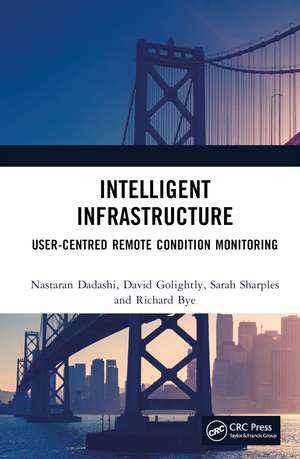Intelligent Infrastructure: User-centred Remote Condition Monitoring
Autor Nastaran Dadashi, David Golightly, Sarah Sharples, Richard Byeen Limba Engleză Hardback – 4 iul 2023
Understanding and mitigating potential human factors issues could ensure that such vast investments are not wasted. This book considers, in depth, the challenges placed on users of current and future condition monitoring systems. Its primary focus is to understand the cognitive processes, including managing alarms, interpreting data, and collaborating with automation. The book describes a range of human factors methods that can be used to understand the current and future functioning of people and technology in an enhanced maintenance and asset monitoring context. The book also presents a framework for describing these issues systematically and presents the resulting design considerations to increase the effectiveness of individual operators and organisations as a whole.
Preț: 452.14 lei
Preț vechi: 590.12 lei
-23% Nou
Puncte Express: 678
Preț estimativ în valută:
86.56€ • 93.79$ • 72.28£
86.56€ • 93.79$ • 72.28£
Carte tipărită la comandă
Livrare economică 12-26 decembrie
Preluare comenzi: 021 569.72.76
Specificații
ISBN-13: 9781472471444
ISBN-10: 147247144X
Pagini: 154
Ilustrații: 76
Dimensiuni: 156 x 234 mm
Greutate: 0.44 kg
Ediția:1
Editura: CRC Press
Colecția CRC Press
ISBN-10: 147247144X
Pagini: 154
Ilustrații: 76
Dimensiuni: 156 x 234 mm
Greutate: 0.44 kg
Ediția:1
Editura: CRC Press
Colecția CRC Press
Public țintă
AcademicNotă biografică
Dr Nastaran Dadashi is a researcher, educator and a Chartered human factors specialist. She has a PhD in Human Factors (Future Railway Intelligent Infrastructure) from the University of Nottingham (Human Factors Research Group), where she worked as a research fellow. As a researcher, she applies human factors principles to a broad range of industries, including nuclear, health care, and the creative sector. As an educator, Nastaran works with digital experience designers at George Brown College, Canada (School of Design), to ensure that the next generation of digital innovations is accessible, ethical, and responsible.
Dr David Golightly is Lecturer in Human-Systems Integration within the Future Mobility Group, School of Engineering, Newcastle University, UK. David is a Chartered Psychologist and Chartered Ergonomist, researching user-centred design for transport innovation and operations. This has included application of knowledge elicitation from experts for rail socio-technical systems modelling, and in the human aspects of operational safety and performance for transport systems. David has also applied knowledge elicitation and decision-making analyses in support accident and incident investigation, for manufacturing, and in hospital care co-ordination. Prior to his research career, David led commercial usability and user-centred design programmes at a global telecoms provider, and a FTSE100 fintech provider.
Professor Sarah Sharples is Professor of Human Factors at the University of Nottingham. From 2015-16 she was President of the Chartered Institute of Ergonomics and Human Factors. She is co-Editor of the Ergonomics and Human Factors text book ‘Evaluation of Human Work: 4th edition’. In 2021 she was appointed as Chief Scientific Adviser to the Department for Transport.
Richard Bye is Head of Ergonomics and Human Factors at Network Rail. With more than 15 years of hands-on human factors experience in the rail industry, he has been involved in a wide range of physical, cognitive and organisational ergonomics projects. Richard has worked on initiatives as diverse as the assurance of safety-critical operational processes, the introduction of smartphones and tablets for frontline track workers, the development of decision support tools for the railway’s internet of things, and the implementation of new technology to increase the resilience of real-time rail operations.
Dr David Golightly is Lecturer in Human-Systems Integration within the Future Mobility Group, School of Engineering, Newcastle University, UK. David is a Chartered Psychologist and Chartered Ergonomist, researching user-centred design for transport innovation and operations. This has included application of knowledge elicitation from experts for rail socio-technical systems modelling, and in the human aspects of operational safety and performance for transport systems. David has also applied knowledge elicitation and decision-making analyses in support accident and incident investigation, for manufacturing, and in hospital care co-ordination. Prior to his research career, David led commercial usability and user-centred design programmes at a global telecoms provider, and a FTSE100 fintech provider.
Professor Sarah Sharples is Professor of Human Factors at the University of Nottingham. From 2015-16 she was President of the Chartered Institute of Ergonomics and Human Factors. She is co-Editor of the Ergonomics and Human Factors text book ‘Evaluation of Human Work: 4th edition’. In 2021 she was appointed as Chief Scientific Adviser to the Department for Transport.
Richard Bye is Head of Ergonomics and Human Factors at Network Rail. With more than 15 years of hands-on human factors experience in the rail industry, he has been involved in a wide range of physical, cognitive and organisational ergonomics projects. Richard has worked on initiatives as diverse as the assurance of safety-critical operational processes, the introduction of smartphones and tablets for frontline track workers, the development of decision support tools for the railway’s internet of things, and the implementation of new technology to increase the resilience of real-time rail operations.
Cuprins
1. Introducing human factors for remote condition monitoring. 2. Remote condition monitoring and predictive maintenance. 3. Challenges of Remote Condition Monitoring. 4. Human factors to explore remote condition monitoring. 5. Understanding cognition within maintenance contexts. 6. Understanding alarm handling: a case in railway Electrical Control Systems. 7. Cognitive Work Analysis to understand asset monitoring and management. 8. Defining Intelligent Infrastructure and identifying the key challenges. 9. Final remarks.
Descriere
This book considers the challenges placed on users of current and future condition monitoring systems. Its primary focus is understanding the cognitive processes, including managing alarms, interpreting data, and collaborating with automation.
